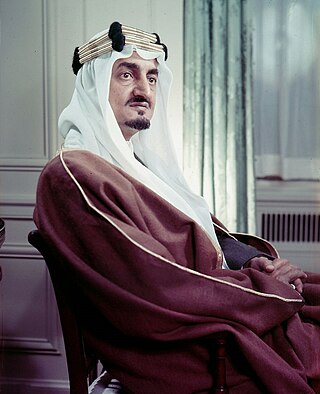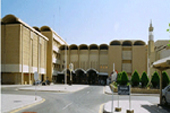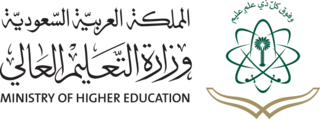
Faisal bin Abdulaziz Al Saud was a Saudi Arabian statesman and diplomat who was King of Saudi Arabia from 2 November 1964 until his assassination in 1975. Prior to his ascension, he served as Crown Prince of Saudi Arabia from 9 November 1953 to 2 November 1964, and he was briefly regent to his half-brother King Saud in 1964. He was prime minister from 1954 to 1960 and from 1962 to 1975. Faisal was the third son of King Abdulaziz, the founder of modern Saudi Arabia.

King Saud University is a public university in Riyadh, Saudi Arabia. Established in 1957 by King Saud bin Abdulalziz to address the country's skilled worker shortage, it is the first university in Saudi Arabia. It was known as Riyadh University from 1964 until it was reverted to its inceptive name in 1982. It was converted into an independent non-profit academic institution in 2023.

King Fahd University of Petroleum and Minerals(KFUPM) (Arabic: جامعة الملك فهد للبترول و المعادن, Jāmiʿat al-Malik Fahd li-l-Bitrūl wa-l-Maʿādin – short: Arabic: جامعة البترول Jāmiʿat al-Bitrūl), before 1986 as the University of Petroleum and Minerals, is a public research university in Dhahran, Saudi Arabia. Established in 1963 by King Saud bin Abdulalziz as the College of Petroleum and Minerals, it is ranked among the most prestigious academic institutions in Saudi Arabia and its science, engineering, business, and management programs are highly regarded in the country as well as in the member states of the Gulf Cooperation Council.

Imam Mohammad Ibn Saud Islamic University (IMSIU) (Arabic: جامعة الإمام محمد بن سعود الإسلامية), commonly known as Al-Imam University, is a public university in the sub-municipality of Shemal in Riyadh, Saudi Arabia. It was founded in 1950 as an Islamic seminary by Muhammad ibn Ibrahim ash-Sheikh, the first Grand Mufti of Saudi Arabia. It was renamed the College of Sharia in 1953, before becoming a full-fledged university through amalgamations of other colleges and assuming its current name in 1974. The university also has overseas presence in Indonesia and Djibouti.

King Abdulaziz University (KAU) is a public research university in Jeddah, Saudi Arabia. Established in 1967 as a private university by a group of businessmen led by Muhammad Bakhashab and including author Hamza Bogary, it was named after the country's first monarch, King Abdulalziz ibn Saud. It was converted into a public university by King Faisal in 1974 and is ranked among the most prestigious academic institutions in Saudi Arabia.

Dar Al-Hekma University is a private, non-profit institution of higher education in Jeddah, Saudi Arabia. Classes are taught in English. The University started in September 1999, with the approval of the Saudi Ministry of Education. It received the university status in January 2014.

Public education—from primary education through college—is open to every Saudi citizen. The second largest governmental spending in Saudi Arabia goes for education. Saudi Arabia spends 8.8% of its gross domestic product on education, which is nearly double the global average of 4.6%. Islamic studies are part of the education system alongside scientific and social studies that vary from educational institution to another.

Abdullah bin Abdulaziz Al Saud was King and Prime Minister of Saudi Arabia from 1 August 2005 until his death in 2015. Prior to his ascension, he was Crown Prince of Saudi Arabia since 13 June 1982. He was the tenth son of King Abdulaziz, the founder of Saudi Arabia.

Sabria Salama Murjan Jawhar is a Saudi Arabian journalist and columnist for the Jeddah-based Arab News. She has an expertise in Arabic/English linguistics. She also writes for English-language news outlets, including The Huffington Post, and serves as an assistant professor in the field of applied linguistics. In 2010, Jawhar was named by the Dubai-based Arabian Business magazine as one of the "World's Most Influential Arabs" by ranking her No. 94 in its "Power 100" list. The magazine also listed her in 2011 as one of the "100 Most Powerful Arab Women".

Imam Abdulrahman Bin Faisal University (IAU), formerly known as the University of Dammam (UoD), is a university in Dammam, Saudi Arabia. It is one of the oldest and leading universities in medicine in the country's Eastern Province. It is named after Abdul Rahman bin Faisal, the last ruler of the Second Saudi State and the father of King Abdulalziz ibn Saud, the founder and first monarch of Saudi Arabia

Princess Nourah Bint Abdulrahman University, formerly Riyadh University for Women, is a public women's university in Riyadh, Saudi Arabia. It is the largest women's university in the world. Established in 1970 during the reign of King Faisal bin Abdulalziz, it assumed its current name in 2008 when it was granted university status by King Abdullah bin Abdulaziz and is named after Noura bint Abdul Rahman, elder sister and adviser of King Abdulaziz ibn Saud and the eldest daughter of Abdul Rahman bin Faisal, the last emir of the Second Saudi State.
Prince Sattam Bin Abdulaziz University was formerly known as Prince Salman Bin Abdulaziz University or the University of Al-Kharj. It is a Saudi University located in the city of Al-Kharj, Saudi Arabia. It is under the supervision of the Ministry of Higher Education Saudi Arabia and managed by the Rector of the University, Dr. Abdulaziz Abdullah Alhamid.
Shaqra University (SU) is located in Sahqra, Saudi Arabia, 190 km (120 mi) northwest of Riyadh). It comes under the supervision of the Ministry of Education. The university has twenty-four colleges in various disciplines. It is headquartered in Shaqra with its various colleges being geographically spread in the largest area of the Kingdom of Saudi Arabia covering several governorates and sub-governorates lying in the west of Riyadh.
This article describes the history of using educational technology in Saudi Arabia. It highlights the history of using educational technology in the Kingdom of Saudi Arabia since the mid-1700s, the beginning, the improvements and the current status. It also describes the rapid increase in using technology in schools, institutes and universities, and presents the attitudes of Saudi people towards this global phenomenon.

The College of Medicine in King Saud University was established as the first medical college in the Kingdom in 1967. One year later, King Abdul-Aziz University Hospital, became affiliated with the college and subsequently in 1981, King Khalid University Hospital and the new college building were established to become the main teaching campus and patient service facility. To date, the college has graduated more than 4000 undergraduate students, 200 postgraduates students, and more than 700 graduates from different medical specialties fellowship programs.

Higher education in the Arab world is non-compulsory, formal education that occurs after secondary education in the twenty-two Arab states.
Saudi Arabia is a theocracy organized according to the principles of Islam, which puts emphasis on the importance of knowledge and education. In Islamic belief, obtaining knowledge is the only way to gain true understanding of life, and as such, both men and women are encouraged to study. The way of practicing Wahhabi Islam has therefore led to gendered segregation in education in Saudi Arabia, which further perpetuates gender division in political, economic, and labor force environments.

The Ministry of Education(MoE) (Arabic: وزارة التعليم), before 2003 as the Ministry of Knowledge and until 1953 as the Directorate of Knowledge, is a government ministry in Saudi Arabia that is responsible for regulating primary, secondary and higher education in the country. It was established in 1926 by Ibn Saud in the Kingdom of Hejaz and Nejd, six years prior to the unification of Saudi Arabia. Since the amalgamations of the General Presidency for Girls' Education (GPGE) in 2002 and the Ministry of Higher Education (MOHE) in 2015, it became the sole body which supervises all schools, universities and colleges in the country.
The Ministry of Higher Education and Scientific Research is a department of the Government of Syria that is responsible for maintaining and implementing government policies in higher education in Syria.

Ministry of Higher Education (MOHE) (Arabic: وزارة التعليم العالي) was a government ministry in Saudi Arabia that oversaw tertiary education in the country. Established in 1975, it was disbanded and subsequently merged into the Ministry of Education in 2015 following a royal decree issued by the newly crowned monarch, King Salman.


















